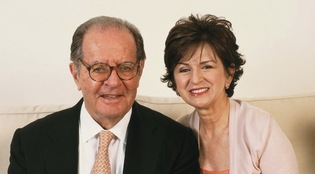 loading
loading
Where They Are NowAnonymous donors tell all!The School of Music benefactors discuss their gift.  Stephen Adams '59 and Denise Rhea Adams say they are coming forward about their gift to encourage his classmates to give. View full imageIn 2005, an anonymous $100 million gift made it possible for the School of Music to waive tuition for all its students. Not long ago, Stephen Adams ’59 confessed to some of his classmates that the gift had come from the Adams Family Foundation, which he runs with his wife, Denise Rhea Adams. Adams made his fortune through several diverse ventures, including Adams Outdoor Advertising; the Affinity Group, which markets clubs, events, and magazines for RV owners; and wineries in California and Bordeaux, France. We interviewed Mr. Adams at their home in Roxbury, Connecticut; Mrs. Adams joined in by telephone for part of the conversation. Y: Why did you choose to give so generously to the School of Music? SA: Musicians at the beginning of their careers are really not particularly well paid. It would really serve a purpose if they had a tuition-free environment. DRA: Often artists and musicians end up in non-related fields. They can't pursue their dreams because they can't imagine the next 25 years in such debt. SA: So when we looked at the possibilities for having a very large impact, we decided this would be the best opportunity. And I think it has certainly fostered some additional thinking, as time has gone by, about a broader tuition-based gift program at Yale. Y: What is your philanthropic vision? DRA: Our philanthropy is generally in education, and under the umbrella of education we typically support art and music. The two major music gifts we've given were to Yale and Westmont College [a Christian liberal arts college in Santa Barbara, California], because we believe in the broader university. We haven't given to music conservatories because we want to encourage the classical education in liberal arts. We also support World Vision [a Christian humanitarian organization]. Y: Your advertising company donated about $1 million in billboard advertising for the campaign of George W. Bush [’68] in 2000. What did you like about his policies? SA: At the time, I liked the fact that he was considered a conservative Republican, his background was Yale, he was Skull and Bones, and his fiscal policies were considered conservative. Y: Do you still support George W. Bush? SA: [Laughs.] That's a good question. I have been disappointed, particularly in the fiscal arena. I wish there had been more attention in vetoing spending bills and government programs that need not be part of the economy. Y: How do you feel about the war in Iraq? SA: Like most people, I was convinced it was the right thing to do at the time, but hindsight being perfect, I think we would have perhaps been just as well off not going to war in Iraq, and focusing our attention on the Taliban and Afghanistan. Y: Why did you choose to remain anonymous when you gave your $100 million gift to the School of Music three years ago? SA: Well, we have a strong religious foundation, and the Bible says it is wiser to give in secret. Y: Why is it wiser? SA: Because it doesn't point the importance to the giver; it points to the recipients. The attention really should go to them. Y: But you have changed your point of view? SA: No, I have not changed my point of view. [In November 2005], the attention was given to Yale. In a way it is anticlimactic to announce it later, but we wanted to encourage members of the Class of ’59 to participate in a 50th reunion gift. Y: How is your class doing? SA: We're hoping to exceed the record gift that the Class of 1954 gave to Yale. Y: What role does music play in your daily life? SA: Well, it started about ten years ago, when I decided to take up the piano. My wife is an artist. She paints. I think her enthusiasm for the arts encouraged me. I took lessons from John J. Contiguglia [’59, ’61MusM], a classmate. I would go down to New York City every other week and spend some time with John. I would practice about an hour a day, and I got to the point that I wasn't all that bad. Then a couple of years ago, I was diagnosed with Parkinson's. The right hand got to be a little bit of an issue: it had some tremors. So my piano days are behind me. Y: There are a lot of one-handed compositions. SA: There are. I have seen them performed. I haven't tried any yet, but that may be on my horizon. Y: Do you have a piece of music you would want to take with you if you were sent to the proverbial desert island? SA: I would choose a composer rather than a piece. And I would choose Chopin. His work is so melodic, so intellectual, so varied, and so masterful. I just can't imagine how anybody can compose like that. But he did it superbly. Y: Did you take any music classes at Yale as an undergraduate? SA: I did not. Y: Do you sing when you are showering? SA: I don't [laughs]. I sing in church.
The comment period has expired.
|
|